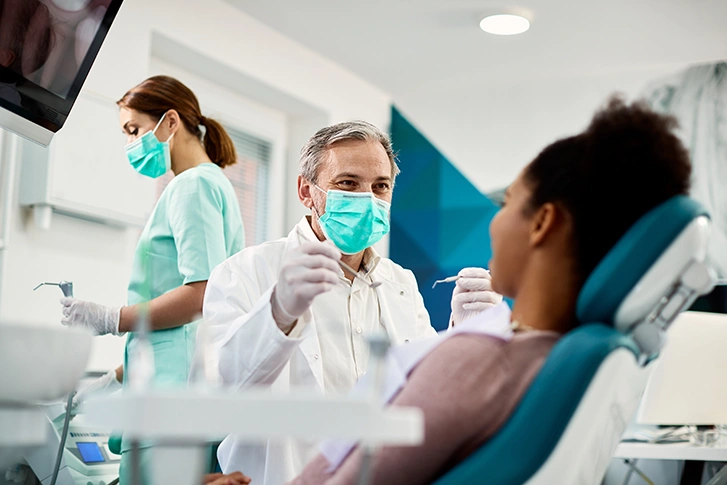General Dentistry London
All areas of dentistry, including routine examinations, general dental care, preventative dentistry, and even cosmetic dentistry, are included in Art Dentistry's general dentistry, as the name suggests. To put it briefly, general dentistry handles all of your oral health requirements!
Do you have questions about how often you should visit your general dentist? Everything is taken care of by us. In this piece, we'll discuss the numerous aspects of general dentistry and show you why maintaining a beautiful, healthy smile is so crucial.

A Complete Guide To General Dentistry
- The primary objectives of general dentistry are the prevention, identification, and treatment of common dental issues.
- Art Dentistry is the best place for you if you are experiencing problems determining whether you need general dentistry or speciality dentistry. We can counsel you on whether you need general or speciality care because all of our clinicians are housed under one roof.
- General dentists execute a wide range of operations, including fillings, crowns, bridges, extractions, and dentures.
- Regular dental examinations and cleanings are essential for maintaining good oral health and identifying dental problems early on.
- Oral hygiene practices—including brushing, flossing, and regular examinations—are crucial for preventing dental issues and improving overall oral health.

What Is General Dentistry?
"General dentistry" is the branch of oral healthcare that focuses on the identification, management, and avoidance of common dental issues. Regular dental examinations are particularly beneficial because they enable dentists to identify and correct problems early on. This helps postpone the onset of more serious ailments such as dental decay, gum disease, and oral cancer.
At Art Dentistry, we believe that having the right balance between general dentists and expert clinicians is crucial. After receiving your call, our treatment coordinators will quickly ascertain whether you need to make an appointment with a specialist or a general practitioner. If we are doubtful, you will be arranged to see one of our wonderful dental therapists.

Common Dental Check-Ups
These dental exams help dentists and dental therapists detect and address oral health issues early on. Regular dental checkups have several benefits beyond just preserving general oral health and proper hygiene.
Oral cancer screenings are a crucial part of regular dental examinations. To detect any abnormalities or lesions that may indicate oral cancer, dental therapists or dentists thoroughly examine the mouth, taking into account the cheeks, gums, lips, tongue, and throat.
X-rays are also crucial to dental exams because they help dental therapists and dentists find concealed dental disorders such as tooth decay and issues with previously placed dental restorations.
Common Dental Care Services
Among the general dental treatments are:
- Fillings
- Caps
- Bridges
- Dentures
- Extractions

Fillings
Fillings are used to fix teeth that have been damaged by cavities or dental disease. They help preserve your teeth's structural integrity and function while also preventing further tooth decay.
There are several materials used for fillings, including amalgam and dental composite. Your dental therapist will recommend the best course of action based on your specific needs.
Before starting the filling treatment, your dental therapist will numb the area using dental anaesthetic to ensure your comfort. After the filling is placed, you may experience some sensitivity in your teeth; however, this should pass after a few days. Regular dental exams and excellent oral hygiene practices are essential for the longevity of your fillings and the avoidance of cavities!

Crowns
Dental crowns are a popular dental operation used to restore the strength and function of a seriously damaged tooth. With a crown restoration, the injured tooth is protected and given a new appearance by being covered in a cap that mimics a real tooth.
There are several different types of dental crowns, such as metal, porcelain, ceramic, and composite resin crowns. The standard steps in placing a dental crown are preparing the tooth, obtaining impressions, fitting, and cementing the crown. Dental crowns have several benefits, such as improving the tooth's aesthetics, restoring its function, and protecting it from further damage. Regular dental care, such as brushing and flossing, is necessary to maintain dental crowns.
Bridges
Bridges are dental implants that unite two nearby teeth to fill up the spaces created by lost teeth.
There are three key points to remember when it comes to bridges:
- Advantages and Categories: There are several different kinds of bridges, including cantilever bridges, Maryland bridges, and conventional bridges. In addition to helping you chew and speak again, they also prevent surrounding teeth from moving, which is just one of their numerous benefits.
- Procedure and Cost: Before the permanent restoration, the abutment teeth must be prepped, impressions taken, and a temporary bridge installed. Two examples of variables that impact the cost are the type of bridge and the materials used.
- Upkeep and Care: Sufficient upkeep and care are essential to a bridge's lifespan. This includes brushing and flossing regularly, avoiding sticky foods, and seeing the dentist for checkups. A sturdy, long-lasting treatment that can enhance your smile and oral health is a bridge.
Dentures
The two main varieties of removable dentures are those made of acrylic and chromium. Lost teeth and surrounding tissue are replaced with removable appliances called dentures. Partial dentures fill in the gaps left by lost teeth, whereas complete dentures replace every tooth in your mouth. These two types of dentures are available. Dentures need to be properly maintained to survive a long time. This means visiting your dentist regularly for denture maintenance and repairs, as well as cleaning and applying adhesive to keep your dentures snug.
The price of chrome and acrylic dentures might vary depending on the style and materials used, so it's vital to discuss your options with your dentist to determine which is ideal for you.
Extractions
Tooth extraction is a frequent general dental procedure that may be necessary for severely decaying or damaged teeth, including wisdom teeth. It's important to keep in mind that, although they are rare, complications from tooth extractions might happen and include bleeding, infection, and dry sockets.
It is recommended that you adhere to your dentist's aftercare advice to guarantee a seamless recovery from tooth extraction. These guidelines can advise taking painkillers, avoiding particular meals, and applying ice packs to minimise swelling.
It's crucial to discuss tooth loss alternatives with your dentist, such as root canal therapy or dental crowns, to protect your original tooth!
Dental Hygiene
Keeping your mouth healthy requires practising good oral hygiene. Among the things that constitute healthy dental practices are:
- Brushing your teeth at least twice a day with the proper dental cleaning techniques.
- By cleaning food particles and plaque out of the crevices between your teeth, flossing daily can prevent gum disease and tooth decay.
- Fluoride-containing toothpaste helps to strengthen tooth enamel and stave off dental decay.
Regular dental cleanings by dental therapists or hygienists are also necessary to maintain oral health since they:
- Remove any deposits of tartar and plaque that brushing alone is unable to reach.
- Identifying any early signs of dental issues.
- Prevention of bone loss associated with periodontitis.
You could also consider the following to maintain fresh breath:
- Using toothpaste
- Steering clear of meals strong in sulphur.

Cosmetic And Dental Care Services
Your smile can be improved by several cosmetic dentistry operations that deal with issues like gaps, chips, cracks, and discoloured teeth. Procedures in cosmetic dentistry are intended to improve the appearance of your teeth, changing the way you smile and increasing your confidence and sense of self.
Aesthetic dentistry, often known as cosmetic dentistry, offers a range of dental makeovers and cosmetic smile enhancements to suit your individual needs. Cosmetic dentistry techniques like veneers, composite bonding, teeth whitening, and orthodontic treatments are available to assist you achieve your goals. Private cosmetic dental practices can be found throughout the UK, offering convenient appointment times.

How Often Should I Go To The Dentist?
Dental professionals are trained to detect problems that may not be painful or evident, which is why routine examinations are so important. Regular exams can help in the early identification of oral health issues such as cavities, gum disease, and even oral cancer. By addressing these issues early on, you can ultimately save time, suffering, and financial resources.
There are benefits to preventive dental care. For example, sealants and cleanings can help lower the risk of gum disease and cavities. Frequent dental checkups make these operations possible. Your oral and overall health can also be preserved with the help of these procedures.
Schedule Your Appointment Today!

